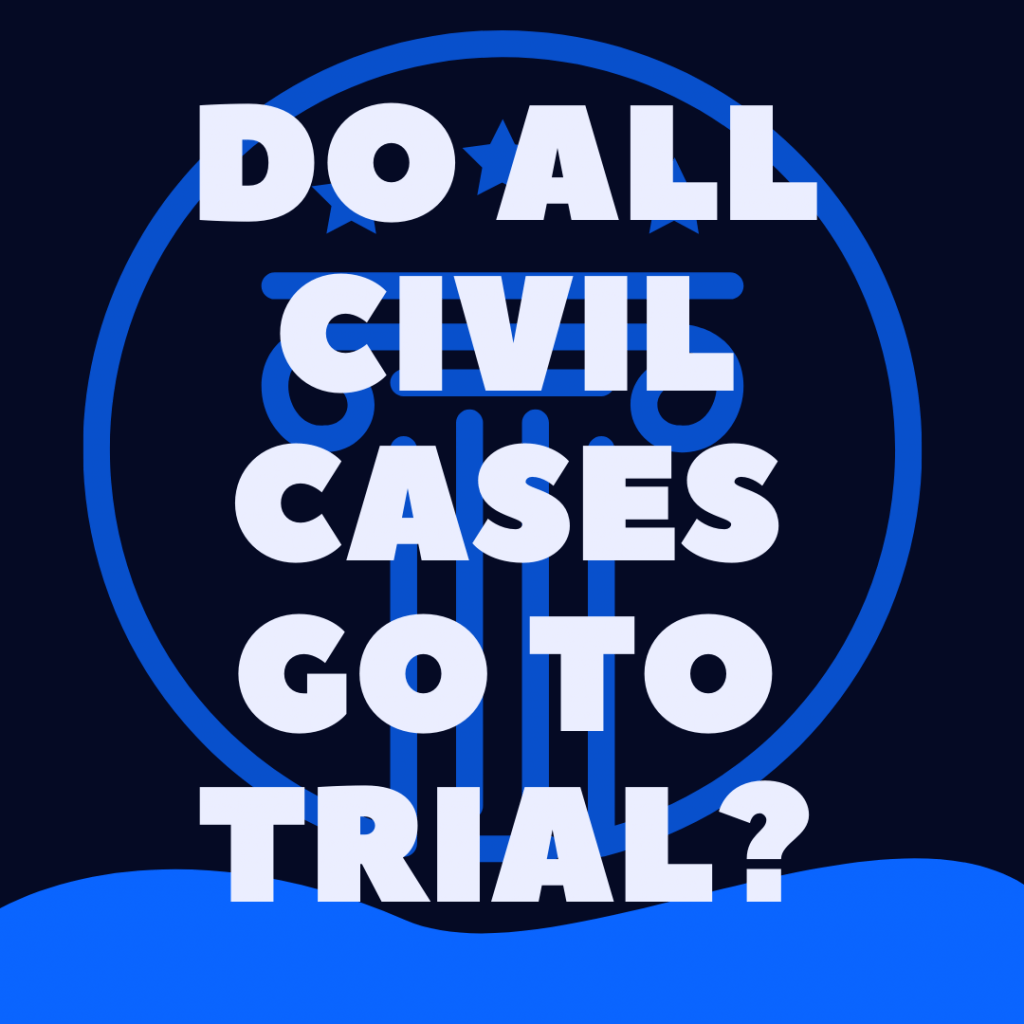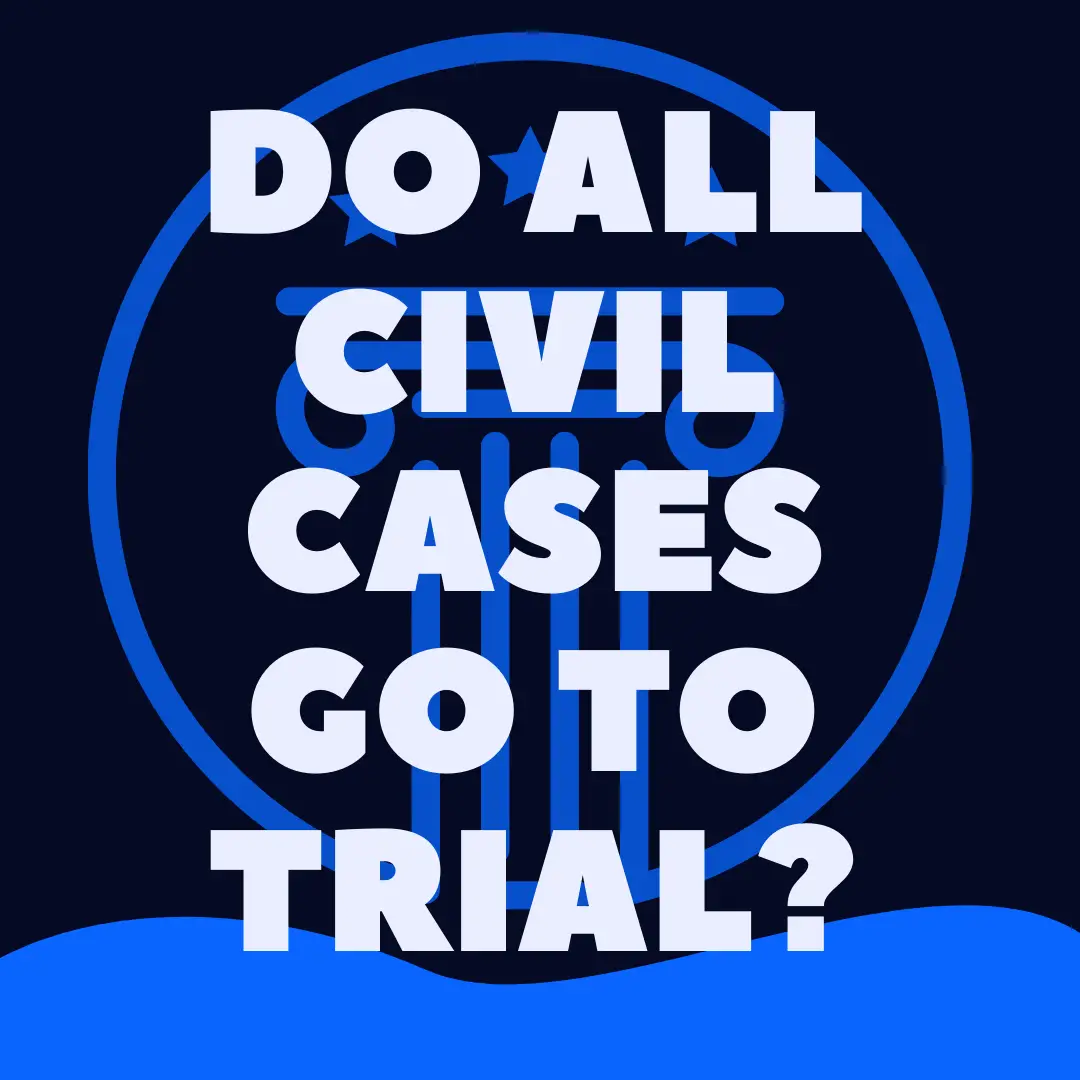No, all civil cases do not go to trial.
In fact, most civil cases do not go to trial.
In the article that follows, we’ll explain several of the reasons why most civil cases do not go to trial.
Do All Civil Cases Go To Trial? (EXPLAINED)
Disclaimer
The contents of this web page are for informational purposes only, and nothing you read is intended to be legal advice. Please review our disclaimer about law/legal-related information on this website before taking action based upon anything you read or see.
Most Courts Have Mechanisms To Avoid Trial
Trials are a heavy burden on the court system.
A trial takes a judge off their other dockets, and pulls other court staff off their regular duties to attend to the jury, the parties to the case, and sometimes even the media.
Only so many trials can occur at any given time.
To reduce the burden on the courts, most jurisdictions have state and local rules which encourage settlement.
For example, many family law cases are forced to go through an attempt at mediation before the trial.
If the parties don’t at least try mediation, their cases cannot go to trial.
In other cases, there is an enforced settlement conference with a judge, who sites down with the parties to try and get the case resolved.
While a civil settlement conference could take an entire day, this might be preferable to a trial which lasts a week or even longer.
Some cases under a certain dollar amount are directed to arbitration before they go to trial (a less formal process without a jury).
Other cases go to small claims, where the parties again often have to face a mediator before going to trial.
The Parties Cannot Afford Trial
Many clients with meritorious claims end up settling their cases because they simply cannot afford the legal fees to take the case to trial.
The costs of a lawyer preparing for trial and then attending a trial (especially if the trial goes for multiple days) are staggering.
As a lawyer, I would usually prep 1-3 hours for every hour of trial I attended.
You can imagine how quickly the legal fees rack up when the lawyer is charged $300/hour, or even more.
When faced with thousands of dollars of legal fees, many clients choose to avoid trial, even if they don’t feel as good about the outcome.
Trial Is Too Stressful
Lawyers are used to appearing in court.
Their clients are not.
A jury trial is a very formal event.
It can be fraught with tension.
The client may have to testify.
This is not a pleasant experience for many clients, and many choose to settle their claims simply to avoid the experience.
A Settlement Is A Guaranteed Outcome
When a case goes to trial, the outcome is out of the hands of the client.
Instead, the judge or a panel of people make the decision.
The clients risk that one side or the other will win, and win big.
Even a client with an excellent case risks losing at trial, as so much is outside of the control of the client and his legal team.
Witnesses change their testimony.
Witnesses lie, or don’t even bother to come to court.
Judges make decisions during the trial that are wrong or unfair.
Sometimes an influential juror decides that your hair color is wrong.
Even the best case in prep can go sideways during a trial.
People often choose to settle a case for less than what the case is worth because at least they can have a hand in the outcome, and the outcome is not resting upon other unreliable individuals.
Trial Takes A Long Time
Getting a case to trial is a long road.
It takes a long time to get a trial date, and there’s no guarantee that your case won’t get bumped due to court scheduling concerns outside of your control.
Even if you get the case to a trial, there’s no guarantee that everything will finally be “over.”
The parties can appeal decisions, and if you thought the trial process was slow, you should see how long an appeal takes.
If the case settles instead of going to trial, the parties have certainty that at least things are “over.”
Public vs Private
Trials are a matter of public record.
Only in special circumstances is a trial or any of the evidence presented during the trial protected or made private.
This means that the newspaper could report on the case.
This means that your neighbor could come and sit in the back to observe.
From a business standpoint, and a personal standpoint, there are many reasons why a private settlement is preferable to a public trial.
Settlements, on the other hand, are almost always handled privately with the lawyers and the parties.
The parties can even agree not to disclose the details of the settlement.
I can think of very few instances where a public trial airing all the dirty laundry is better for the parties than a private and confidential settlement.
Should You Settle Your Civil Case?
Heck if I know!
That’s between you and your attorney.
Random people on the internet can’t give you legal advice and you shouldn’t accept the advice of someone who doesn’t know anything about your case.
The best thing to do is to talk to your lawyer about it to review the pros and cons of a settlement vs trial.
Wrap Up
You might also like:
- 7 Types of Person Injury Cases
- Can You Legally Change Your Birthday?
- Deposition Questions To Get Started
- Can You Be Served Over The Phone?
Want to learn more about your criminal justice system?
Browse our free legal library guides for more information.


